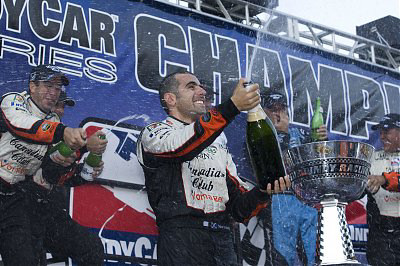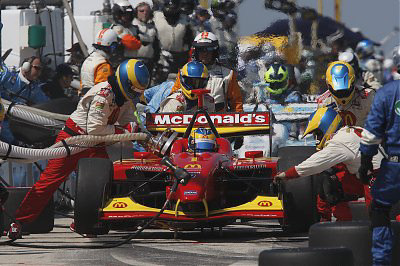The Way It Is/ Bill France had it figured out ten years ago
by Gordon Kirby Both of this country's dueling open-wheel series are over for this year, on American soil at least, and each of the IRL and Champ Car's futures remain clouded, as ever. One thing that is clear is the IRL has pretty well won the war for dominance of American open-wheel racing. In the past few years, Champ Car's TV ratings and overall media coverage have dwindled to barely measurable numbers. The IRL's ratings are hanging in there, but there's nothing to be proud of in its poor overall media numbers either.
Both of this country's dueling open-wheel series are over for this year, on American soil at least, and each of the IRL and Champ Car's futures remain clouded, as ever. One thing that is clear is the IRL has pretty well won the war for dominance of American open-wheel racing. In the past few years, Champ Car's TV ratings and overall media coverage have dwindled to barely measurable numbers. The IRL's ratings are hanging in there, but there's nothing to be proud of in its poor overall media numbers either.
At least the IRL enjoyed an exciting and compelling championship battle this year with a great, grandstand finish, but both series face serious problems in attracting more ink and air time, and in rebuilding and retaining their fan bases, too. The loss of some of the IRL and Champ Car's biggest stars will make this problem even more difficult.
Indy 500 winner and IRL champion Dario Franchitti has been weighing offers from Roger Penske to join his Penske ALMS team and from Chip Ganassi to go NASCAR Cup racing. Penske wanted Franchitti to replace Ryan Briscoe--who's taking Sam Hornish's IRL seat--in one of the Penske Porsches. But to the surprise of many Franchitti has decided to make the move to NASCAR in Ganassi's #40 Dodge Cup car, driven the past two years by David Stremme.
I talked to Ganassi on Sunday afternoon and asked him about Franchitti becoming Juan Montoya's teammate in his Cup team. Chip didn't answer. He could only giggle, almost but not quite uncontrollably.
So both Franchitti and Hornish are leaving the IRL to race in NASCAR, joining the growing trend of open-wheel drivers getting on board the NASCAR juggernaut. Needless to say, Franchitti and Hornish--Indy 500 winners and IRL champions both--will be hard to replace although they will likely continue to run the Indy 500 around their regular NASCAR commitments.
In Champ Car, the big question is who will replace Sebastien Bourdais at Newman/Haas if Justin Wilson cannot be prised away from RuSport? There are no other obvious star drivers available and certainly nobody to spark the interest of sponsors, the public or the media. And if Tracy and the Forsythe team continue to struggle into next year and the now aging Canadian is no longer a frontrunner, who will Champ Car's star attractions be? It's a little much to expect it all to fall on the shoulders of young Graham Rahal.

© LAT USA
This used to be CART's great claim to fame. It was the specific challenge which separated Indy car racing from Formula 1 and made it even more of an adventure for drivers like Mario Andretti, Emerson Fittipaldi and Nigel Mansell, each of whom won both F1 and CART titles. But today, the IRL has a much more legitimate claim to that mantle than Champ Car which has lost the plot entirely in so many regards, diversity of tracks included.
Of course, Champ Car now finds itself in the invidious position of turning to Europe for growth and income. The dream of the series becoming a North American street racing festival is fading fast with Denver going out of business last year, Phoenix failing to get off the ground, many people questioning the future of the Vegas street race, and an announcement expected at the end of this week that San Jose is getting the axe after only three, fitful years. Maybe they'll go back to Laguna Seca...
Champ Car is now looking to Europe, hoping for four or more races in that part of the world next year. Tracks on Champ Car's wish list of possible European races include Zandvoort, Brands Hatch, Imola, Jerez, Dijon, Spa, Hockenheim and the Nurburgring. There are plenty of tracks in Europe, like Zolder and Assen, looking for cheaper, promotable alternatives to F1. Even at bargain basement rates, these tracks can afford to pay Champ Car more than the organization can command for most of its home races. And of course, there's the attraction of a field more than half-full with European drivers who haven't quite made it to F1--or can't quite afford it--but enjoy European or international sponsorship.
The other side of the coin is that the more overseas races, the less saleable Champ Car is in the United States. As I've written before, this concept of racing worldwide was touted two or three times over CART's unfortunate history and proven to be a schizophrenic failure. American divisions of international companies want races in the United States, and usually aren't even interested in Canadian races. Newman/Haas/Lanigan's general manager Brian Lisles talked about this matter in this space two months ago.
"Overseas races make money for the series owners, but lose money for the teams," Lisles explained. "Champ Car is paid a lot of money for those races, but they are expensive for us to do and they don't bring us any sponsorship. Our sponsors are American divisions of companies, not international divisions, and when we have an overseas race the international or regional division gets the credit for the exposure, not the American division that's paying the bills. So it's a loser for us, all-round."
This year there were only seven American races on the Champ Car schedule--a record low--and it's entirely understandable that Newman, Haas and Lanigan want Champ Car to focus on building a stronger base of American races. They are extremely frustrated that there seems to be little or no chance of that happening.
There are two other aspects to Champ Car's European intentions. First is the issue of dealing with the FIA which Champ Car already has discovered is less easy than imagined, particularly when your key people are deeply naive about the matter. But by going to Europe, Champ Car is putting a major component of its plans for growth in the hands of the FIA and many people who have been around the sport for years believe this is an extremely precarious position in which to place oneself.

© LAT USA
The other point is that by abandoning oval tracks and having fewer American races overall, Champ Car is losing any claim to being the American national driving championship. In fact, it's laughable to even make that suggestion now. Sadly, in 2007, this is another thing the IRL is more qualified to claim than Champ Car. Of course, to the average American there's not the slightest question that NASCAR's Nextel Cup series is the country's national auto racing championship because they don't even know that IRL or Champ Car exist.
Meanwhile, we face the continuing prospect of one open-wheel driver after another getting their butts kicked in NASCAR. Is there any reason to expect that Franchitti, Hornish and Jacques Villeneuve will do anything other than join Montoya among those guys excited about the chance of getting another top twenty finish in their next Cup race? And what of A.J. Allmendinger and Scott Speed? Allmendinger certainly has been humbled with Red Bull's novice Cup team this year. What does the future hold for Allmendinger and will Speed be in for an equal shellacking if Red Bull parachutes him into NASCAR next year?
I'm afraid that when it's all over, NASCAR fans and the NASCAR media will laugh at open-wheel racing even more heartily than they do already, and there will be no foundation for any of us to make any argument otherwise. If you think American open-wheel racing's reputation is in sad shape today, be prepared for it to get much worse in the near future.
Here's hoping that either Champ Car or IRL can generate some good news over the winter. The fans need it, the sport needs it, and so do the teams, most of whom live in fear of the sponsorship well running dry.
Ten years ago, during an Autosport Awards dinner in London, I discussed the CART/IRL split, among many other things, with Bill France Jr. France asked me to keep the specifics of our CART/IRL conversation off the record and I honored that agreement during his lifetime.
"You're really worried about Tony pulling the trigger on his new formula, aren't you?" France asked rhetorically. "You think it's going to end up destroying Indy car racing, don't you?"
He paused for a second, glanced down, then looked me straight in the eye. "Well, I agree with you," France declared. "I think it will. You know my father and I always believed there's got to be one man in control and you can't have any competitors. You've got to have one series with a solid name and brand. Those guys are putting themselves in danger of losing all that."
And of course, with all the malarkey going on in Formula 1 and the Stepneygate saga escalating to new heights in a World Motor Sport Council hearing later this week, you have to seriously wonder about the future of open-wheel racing as a whole around the world.
Auto Racing ~ Gordon Kirby
Copyright 2007 ~ All Rights Reserved
Copyright 2007 ~ All Rights Reserved
Top of Page